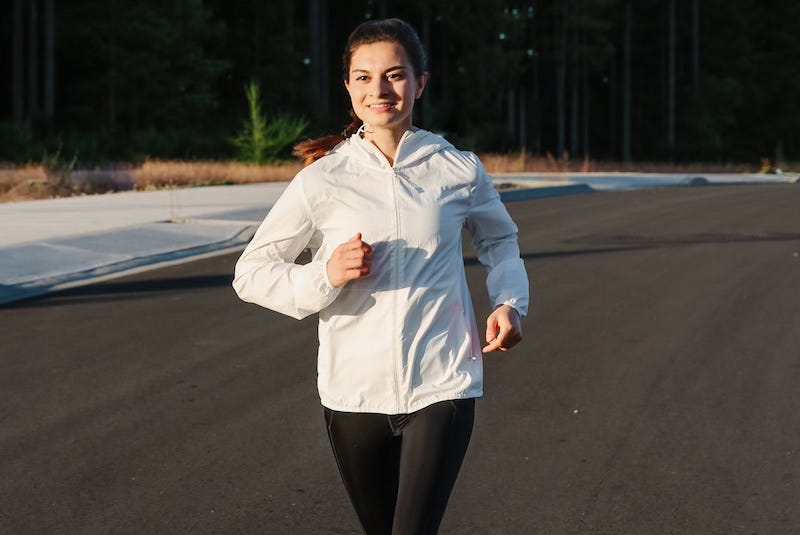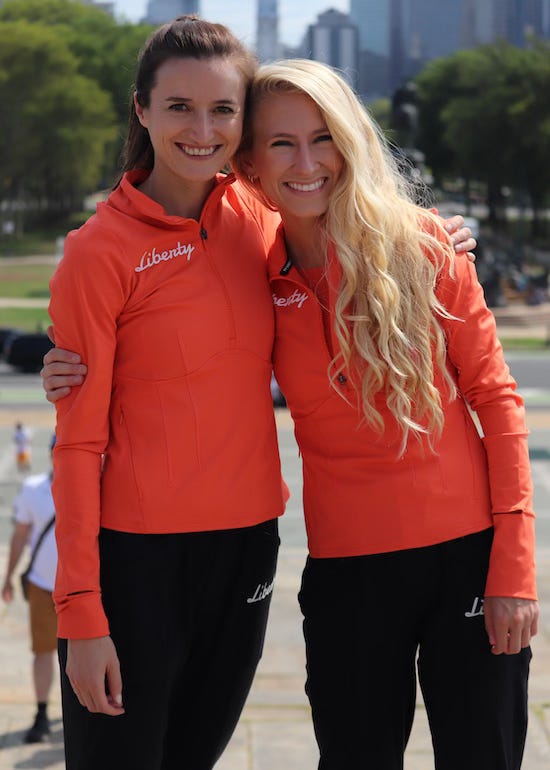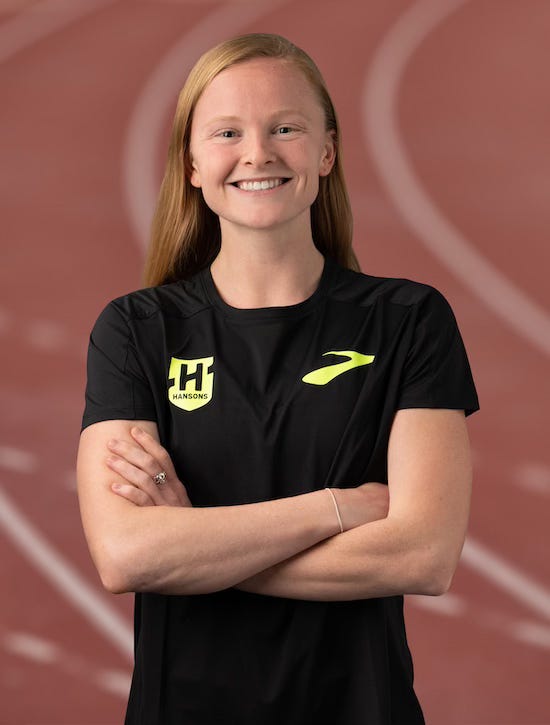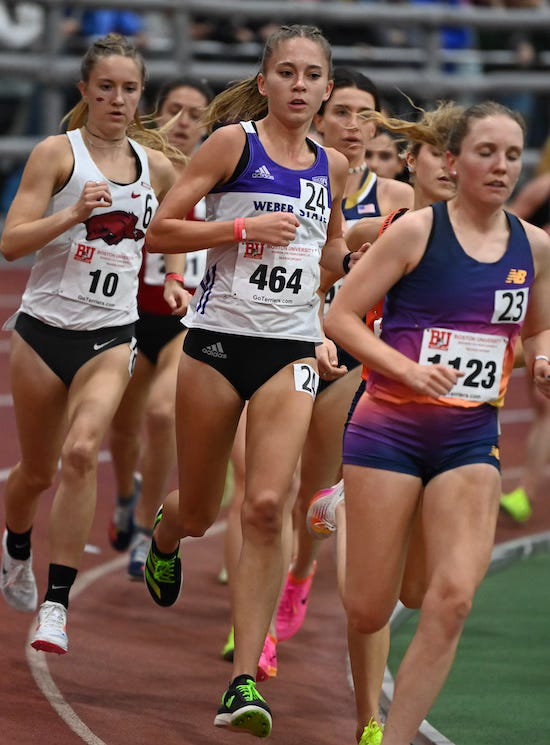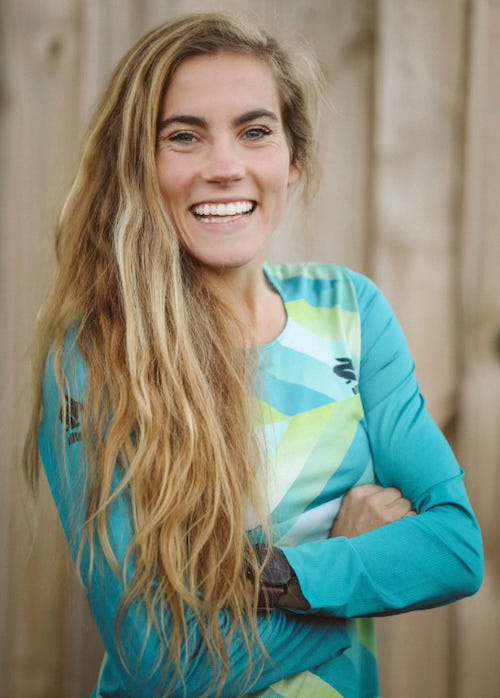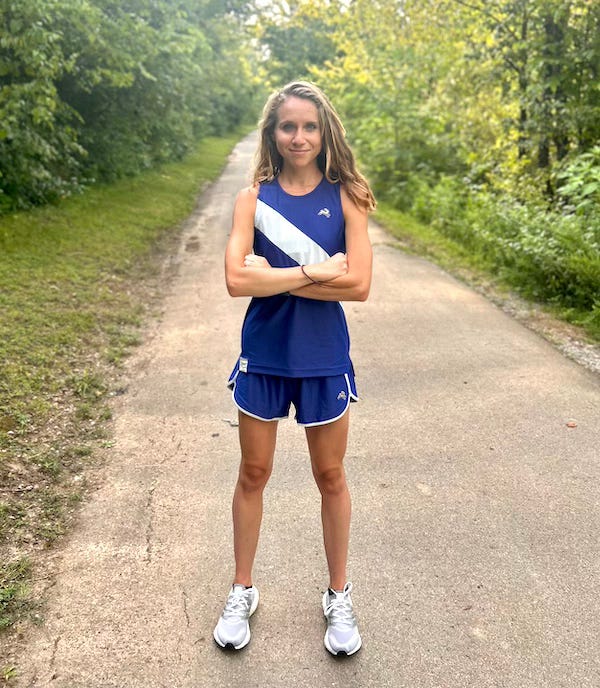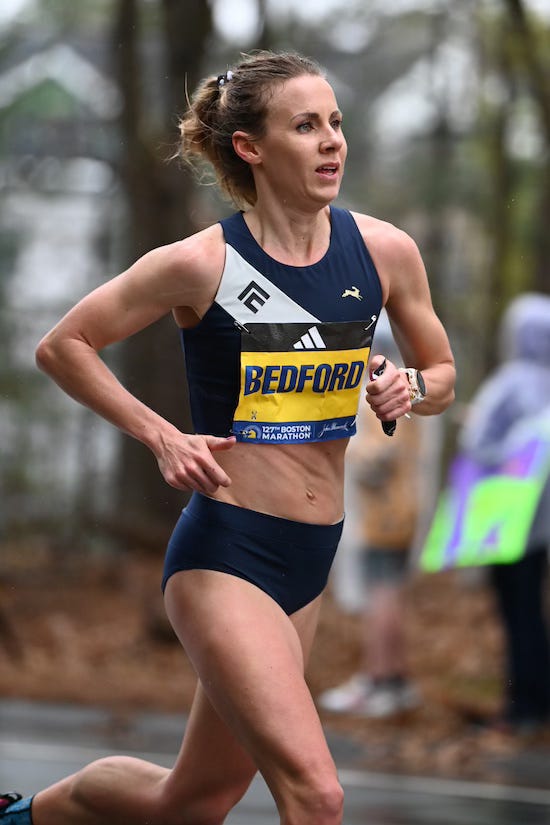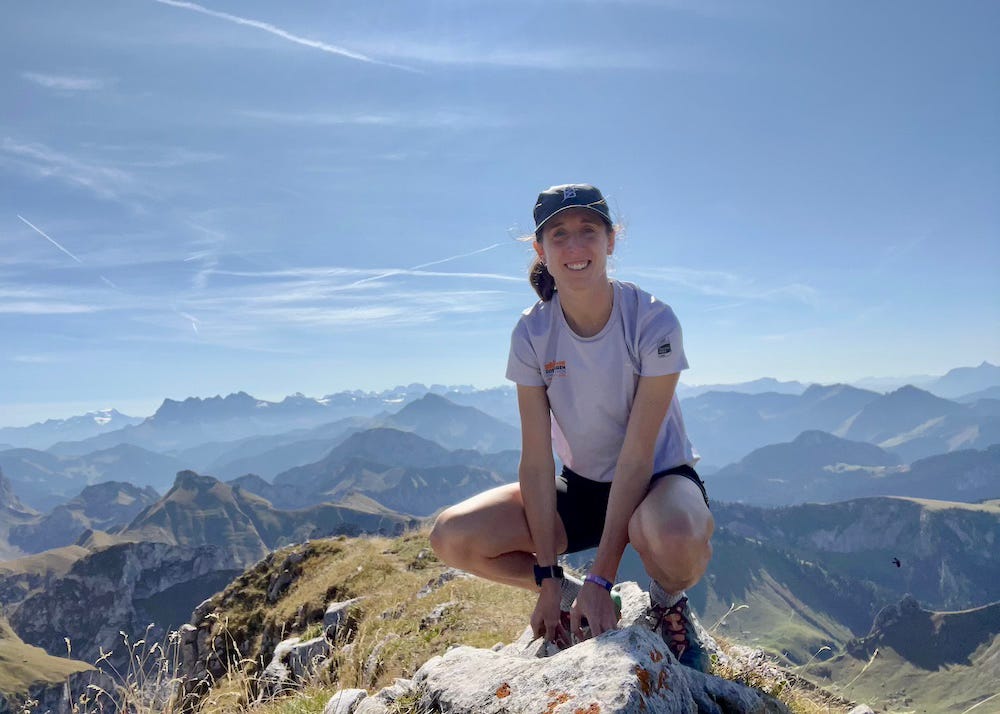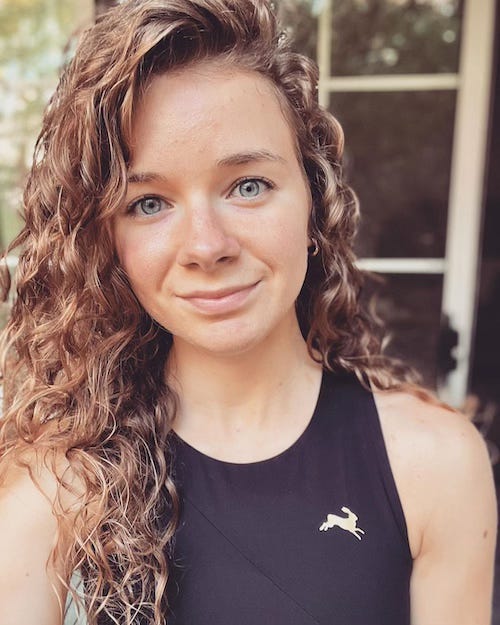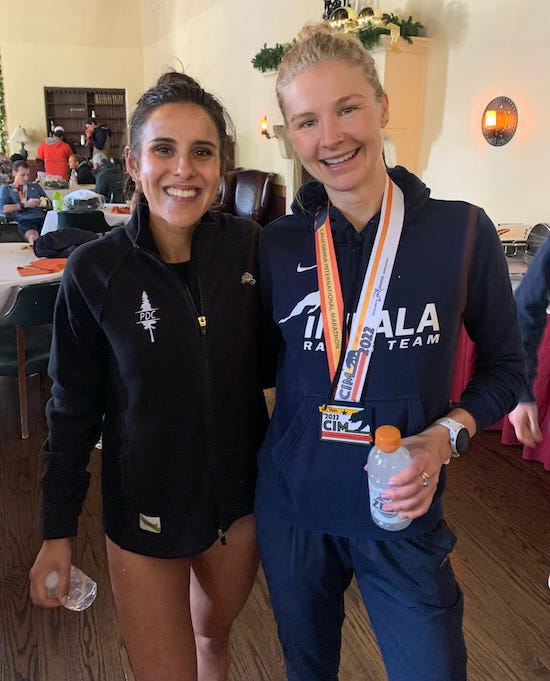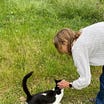Meet some of the 2024 Olympic Marathon Trials qualifiers
One hundred seventy-three women qualified for this year's Trials by running 2:37:00 (or 1:12:00) or faster.
You can read part two of this series here.
Watching the 2021 Olympic Trials inspired Sara Lopez to earn a Trials qualifier of her own
Current Residence: Seattle, Washington
Instagram: @saraannelilopez
Sara Lopez set her sights on qualifying for the U.S. Olympic Marathon Trials after watching the Track Trials in 2021 and hearing the story of Sarah Lancaster, an unsponsored athlete who competed in the 1500 while also working as a full-time lawyer. Lopez reached out to Lancaster on Instagram and asked her how she was competing at such a high level with a demanding job. “She was so nice, and responded saying that she had a coach and a club she trained with,” Lopez said. “It was really inspiring for me, and I decided to give competitive running a shot.”
Lopez then called her mother and told her she wanted to qualify for the Marathon Trials. “It was kind of wild at that point,” she said. “Because I had only run one marathon, in 2020, and I did the bare minimum. It was just for fun.”
But at the 2023 Eugene Marathon, she accomplished her goal, running 2:33:50 to win the race and earn her qualifier. The accomplishment was particularly gratifying after she struggled to make it to several marathon start lines due to injuries like a sprained ankle and a slipped disc.
Coming off of an 11th-place finish at the USATF 10K Championships in September, Lopez struggled with persistent shin pain. But she is now feeling healthy after adding in more cross training and focusing on recovery, strength, and fueling. “It’s been a roller coaster,” she said. “I would have good months and then something would come up, but now I’m running probably the most consistently I have in a while.”
Lopez did not run competitively in college. She ran track and cross country in high school and dreamed of running for BYU. She thought maybe she could train hard and walk on, but her senior year of high school, her family moved to Mexico City, and her new school didn’t have a running program. “I thought that was it,” Lopez said. “I was also working through an eating disorder at the time, which wrecked my relationship with running for a long time. I didn’t even think about running competitively again until I had recovered and healed my relationship with running. I wanted to run again just for the love of it, and to see what my potential was.”
She’s looking forward to using the Trials as a learning experience for future races. “As long as I’m healthy getting to Orlando, I’m happy getting to put myself in the mix,” she said. “I have a future in the sport and want to continue loving running.”
After autoimmune diagnosis, Abbie McNulty earned a last-minute Trials qualifier
Current Residence: San Francisco, California
Instagram: @abbiemcnulty
Abbie McNulty spent three years trying to make it to a marathon starting line. When she finally did, she made it count, running 2:36:00 (2:35:58 chip time) at the California International Marathon in December 2023 and qualifying for the Olympic Trials. McNulty, who graduated from Stanford in 2019 as a two-time All-American, spent the past few years struggling to find an explanation for the injury cycle she was stuck in. Finally, after a stress fracture in May 2023, she was diagnosed with an autoimmune condition that causes joint and bone issues. After treating the underlying problems, everything changed and McNulty was able to start running again in August.
“I had no intention of [running] an OTQ after getting injured so late in the year, but I just felt like training was surprising me and I was building good fitness quicker than I anticipated,” McNulty said. “I don’t know if it’s because there were less expectations and I was having a really good time, but I made the Trials my goal after seeing how I was doing in workouts.”
Now, McNulty is doing a conservative build in the tight turnaround from CIM. After having to put her competitive goals on the backburner for a few years, she is excited about all that lies ahead of her in the marathon distance. She hopes to race smart at the Trials, passing as many people as she can in the later stages of the race. “I’m pretty relentless with what I think I can do long term,” she said. “Even in the injury cycle, when I tried to convince myself it was time to let go, I just kept coming back to running.”
Running a marathon with her father helped reignite Veronica Eder’s love for the sport
Current Residence: Philadelphia, Pennsylvania
Instagram: @veronica.c.eder
Team: Liberty Track Club
Veronica Eder graduated from Auburn University in 2017, and placed 14th and 19th in the 5,000 and 10,000, respectively, at the NCAA Outdoor Championships that year. She felt like she had more to give, so she joined the Roots Running Project in Boulder, Colorado, although she stayed in Auburn, Alabama, doing all her training alone. “I felt a fire and wanted to keep training,” Eder said. “But the grind wore me down.”
She stopped training for a while, until her dad invited her to run a marathon with him for fun, while he tried to qualify for Boston. They ran their marathon in fall 2018, reigniting Eder’s love for the sport. “I wasn’t training as hard as I am now, but I just had a good time,” she said. “Running for fun was a new concept.” Family is of high importance in Eder’s life, as she is currently on leave from work to care for her mother, who has late-onset Alzheimer’s.
After taking about a year and a half off for a hip injury following her first marathon, Eder started to train seriously again in 2020, and began thinking about chasing the Trials qualifying standard, then 2:45, to prove to herself that she could have qualified for that year’s Trials. In fall 2020, with everything shut down, the Richmond Marathon allowed athletes to get USATF-certified times if they ran the course at certain times, using their phone as a tracker. “With my phone in my sports bra, no starting gun, and no spectators, I ran 2:43,” Eder said.
She improved to 2:40 at the 2021 Chicago Marathon, and when the new Trials standard, 2:37, was announced, she decided to chase it. She qualified for the Trials at the California International Marathon in 2022, running 2:35:48.
In the spring of 2022, Eder and Carey Gosselin, who she met through the Philadelphia running community after moving there two years earlier, started the Liberty Track Club. The club now has 25 women, who compete in the 800m up to the marathon, and they meet to train multiple times per week. “Carey and I were looking for a close-knit community, like a college team,” Eder said. “All of us were collegiate athletes.”
Eder’s ultimate goal is to break 2:30 in the marathon. At the Trials, she hopes to chip away at that goal by getting as close to the top 50 as she can, continuing to make progress and enjoying the experience.
Inspired by her college coach, Stephanie Sherman earned her OTQ in her marathon debut
Current Residence: Rochester Hills, Michigan
Instagram: @stephsherm20
Team: Hansons-Brooks Original Distance Project
Stephanie Sherman graduated from the University of Toledo in 2022 and now trains with the Hansons-Brooks Original Distance Project in Michigan, while also working full-time as a medical device research and development engineer.
An Olympic Marathon Trials qualifier had been a goal for Sherman since Samantha Palmer, her team’s assistant coach during college, qualified while working at Toledo. “I always wanted to be like her,” Sherman said. “But when they dropped the time to 2:37, I almost stopped dreaming I could do it.”
Sherman said that her coach, Kevin Hanson, usually has athletes wait until they have spent some time developing at the half distance before moving up to the marathon. But Sherman had spent six months doing half marathon training between her fifth and sixth years at Toledo, when she didn’t think she had any eligibility left, so Hanson thought she was ready during her first season as a professional and that she could qualify for the Trials even with the new standard. “Having a coach who barely knew me already have faith [that I could] do this sparked my fire,” she said.
Sherman’s buildup to her first marathon, the 2022 California International Marathon, was just about perfect, but the race did not go according to plan. She missed her bottle at the first aid station and hit the wall hard at mile 22, but she still ran 2:36:49 and achieved her goal of qualifying.
At the Indianapolis Monumental Half Marathon in October 2023, she stepped in a pothole but still finished the race. It resulted in an injury that kept her out of running until the beginning of December. Sherman’s friends helped her get in contact with a sports psychologist early on in her recovery process. “I hadn’t been injured since 2018, so I didn’t necessarily know how to handle injury, and it scared me,” she said. In college, she drew confidence from running high mileage. Now she is working with the sports psychologist to find other sources of confidence during her comeback.
“I’m grateful for my teammates as well,” Sherman said. “There are times when it’s hard to trust myself, so I can trust others instead. I’m feeding off of their energy like they’re feeding off of mine, so it’s important not to be bringing them down. It helps to put a lot of effort and energy into them.”
In the weeks leading up to the Trials, the Hansons team is at a training camp in Orlando to focus during the final stretch before the race and prepare for the conditions. Originally, her goals for the Trials were to outperform her ranking and get to the starting line feeling like she belongs. “I think that’s something a lot of us struggle with,” she said. “That second goal is still the same, I did still qualify so I still deserve to be there. I’m changing that other one to be the best I can [be] on the day and focus on the process more than on the end result.”
Billie Hatch caught the marathon bug early
Current Residence: Ogden, Utah
Instagram: @billiehatch
Billie Hatch ran her first marathon while she was still in college, targeting an Olympic Marathon Trials qualifying time at the 2022 Grandma’s Marathon. But Hatch faded after mile 18 and ran 2:43. She ran indoor and outdoor track for Weber State in 2023 and went all-in on her goals, but the whole time, she knew she wanted to run another marathon as soon as possible. Hatch graduated as a multiple-time Big Sky conference champion in spring 2023, and then ran 2:35:47 at Chicago in October to qualify for the Trials in her second marathon.
Since graduating, she has stayed in Ogden, Utah, and continues to be coached by her college coach, Paul Pilkington. Hatch runs some workouts and long runs with fellow Trials qualifier Sarah Sellers, who is also coached by Pilkington. During her build for Chicago, Hatch had to learn how to balance training with a full-time job, running before and after work. “I just love running so much that I’m going to find time for it; it’s a non-negotiable,” she said. “I’m in a really good mental spot with running right now and just truly want to be out there.”
At Chicago, Hatch was able to work with a pack of male runners. At mile 25, her coach yelled to her that she was going to qualify, and the men around her began cheering her on. “I felt so supported by people I don’t even know,” Hatch said. She hopes to continue her pattern of improvement at the Trials. “It’s a learning process the whole time, that’s the fun thing about the marathon,” she said.
After a break from competitive running, Claire Benjamin earned an OTQ in her marathon debut
Current Residence: Boulder, Colorado
Instagram: @claire_benj
Team: RISE Athletics
Claire Benjamin moved to Boulder, Colorado, after graduating from Vanderbilt in 2014 with all-SEC and all-South region honors, and began working as a design researcher and coaching at a local high school. “For a while, my own running was just relative to theirs. I wanted to be able to help the varsity girls with workouts if I needed to,” she said. “I love working with these athletes. It pushes me to think critically about training and evaluate what’s best for someone not just physically but emotionally, mentally, and spiritually.”
Working with the high school team brought Benjamin back to the joy that made her fall in love with running in the first place, and also gave her a reason to make her own relationship with running something her athletes could look up to. Benjamin remembers running on the Mesa Trail in Boulder with her husband and dog, saying, “If I can do these types of runs for the rest of my life I will be happy. That will be enough.”
It is with that sense of wholeness that Benjamin returned to competitive running. She raced a half marathon in the fall of 2021 that made her curious about her potential in the marathon. Going into 2023, a conversation with a friend reminded her how exciting it was to be in a position to chase an Olympic Marathon Trials qualifying time. And that led her to December’s California International Marathon. On the last day to qualify, Benjamin made her marathon debut, running 2:36:01 (2:35:53 chip time) and qualifying with room to spare.
“I think I’m still figuring myself out as a competitive runner and especially as a marathoner,” Benjamin said. “I see the Trials as another opportunity to figure things out, run a smart race, and have a good experience overall.”
Ann Marie Pierce qualified for the Trials at her hometown race
Current Residence: Wilmington, North Carolina
Instagram: @annmarielpierce and @ampruns
Ann Marie Pierce ran for Western Michigan University, graduating in 2015, but she did not feel like she made the most of her potential. “There was a lot of effort, but I think the eating disorder I struggled with, as well as the balancing act of everything on my shoulders, made it difficult,” she said. In addition to running and school, she also had a job.
After spending years trying to break 17 minutes in the 5K, in 2022, Pierce started consistently running in the low 16-minute range at road races. That summer, her coach, Tom Clifford, suggested that the Olympic Marathon Trials qualifying standard could be within reach. She ran the Houston Marathon that fall, while she was still nursing the younger of her two sons, and missed the qualifying time by 43 seconds.
Six weeks later, earned her Trials qualifier by winning the 2023 Wilmington Marathon in 2:36:22, with pacing help from her friend, Hugh Crews, who won the men’s race. “His way of pacing made all the difference,” Pierce said. “To qualify at the hometown event was meant to be.”
Pierce trains with the Without Limits adult team for big workouts, and Clifford sometimes paces her for long runs. Most mornings, she wakes up at 4:30 to train before her two sons, ages 2 and 4, are awake. She works from home during the day, and in the evening, she coaches either a local middle school cross country team or the Without Limits youth team.
Pierce is the world record holder in the backwards mile, with a 7:24, which she ran to raise awareness for Optimism Oasis, a nonprofit that serves local youth. She was also inspired by Neely Gracey to run a 5:10 stroller mile, and she also beat the 5K double stroller world record, running 18:51.
In high school, she swore she would run far into old age. “I knew I could never let running go,” she said. “It allows us so many opportunities.”
With her OTQ, Caroline Cole achieved a goal she set as a college freshman
Current Residence: Nashville, Tennessee
Instagram: @carolinehamcole
Caroline Cole ran for Trevecca Nazarene University, a small DII school, and during her freshman year, her coach encouraged the team to write down their dreams and goals. “I wrote several goals, and one was ‘make it to the Olympic Trials,’” she said.
Cole took several years away from the sport after graduating in 2017 to focus on work and other areas of her life, but she returned to running and her goal in 2021. After running a 1:14:42 half marathon in June 2022, she gave herself a year to go all-in on the marathon qualifier.
The following June, she qualified for the Trials by running 2:36:09 at Grandma's Marathon, which marked the culmination of a years-long goal for her. “It was a race where all the stars aligned, and I know how few and far between those kinds of races are,” Cole said. “I dialed in on my fuel plan and knew the exact paces I needed to tackle from the minute the gun went off.”
Cole works as a personal trainer, so she had to learn to be flexible with how she fits training into her days, whether that means running early in the morning or between seeing clients. During her build for the Trials, Cole has focused on speed and race practice, spending more time on the track and racing a few shorter races. “It has made this block exciting, to be racing a little more and tapping back into speed,” she said.
The Trials will be her third marathon in just over one year, following Houston and Grandma’s. “I am still learning constantly,” Cole said. “I am incredibly blessed to get to line up with women I have looked up to.”
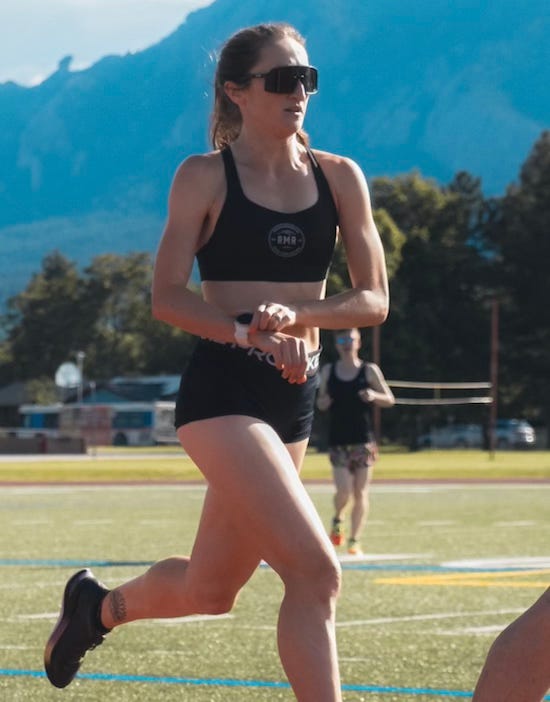
Flannery Davis Love initially resisted going all-in on running
Current Residence: Boulder, Colorado
Instagram: @flannerydavislove
Team: RISE Athletics
Flannery Davis Love did not grow up as a competitive runner. At age 11, she told her parents, who were both serious runners, that she wanted to play Division I soccer in college. Because she lived in a small town in Western Colorado, her parents often had to drive her four hours to practice with the Olympic Development Program and competitive club teams. But they supported her goals.
“My dreams came true, but my college experience was just a lot of difficult events,” Davis Love said. She and her teammates experienced verbal abuse and manipulation at the hands of her coach, and it took three years for him to be fired. Davis Love also struggled with injury and performance anxiety throughout her career.
“That was my whole goal and it kind of fell apart, which set the stage for me to pivot,” she said. “I had become pretty one-dimensional around soccer; it gave me identity and purpose starting in grade school. I had a pretty unhealthy relationship with the sport I did in college, but I still crave competition and being outside and moving my body because it’s something that has brought me joy since I was 3 or 4 years old.”
After college, Davis Love moved back to Colorado to be closer to her family and started experimenting with ski mountaineering, trail running, and mountain running, and found her way into the Boulder running community. “I’ve seen other women transition to running from other sports and their competitive drive followed them. They immediately fell into line wanting to be committed and competitive,” she said. “I was the opposite. I acted almost apathetic towards competition and just wanted to enjoy it.”
Davis Love decided she would only commit to 6–8 week training blocks for races, jumping around in distance and terrain and taking long breaks, subconsciously avoiding the level of competition she had experienced in soccer.
She had discussed the idea of going for an Olympic Marathon Trials qualifier with her coach, Nell Rojas, and eventually Rojas told her if she wanted to pull it off, she would need to give her more than 6–8 weeks of focused training. “If I wanted this thing I had to put more into it,” Davis Love said.
They set their sights on a half marathon in June as a test to see if Davis Love was ready, and after she ran a PR of 1:18, she had confidence she could go for the standard. During that build, she learned to balance more serious training with working full-time as a therapist.
Davis Love qualified for the Trials at Bakline’s McKirdy Micro Marathon in October 2023, running 2:36:52, for an 11 minute, 30 second personal best. During the race, she focused on listening to her body and running her own race. She ended up having a lot to give in the final few miles. And that night, her mother was inducted into her high school hall’s athletic hall of fame. “It was a really cool full-circle moment,” she said.
While training for the Trials, Davis Love is focusing on not being so hard on herself. As she moves back into competitive sports, she’s been working on keeping the performance anxiety and identity issues she struggled with in college at bay. “Sometimes I tell myself that I don’t come from this background, I don’t look like a lot of other runners,” she said. “It can be hard not to [think] that running an OTQ was a one-time thing for me. Those demons from my college days come back, asking if I’m good enough.”
In order to fight her self-doubt and maintain a healthy relationship with the sport, Davis Love draws on her own training as a therapist. “Every time I go on a run or I’m competing, I have this very intentional thought of, ‘This is really important to me but it’s not everything about me,’” she said. “Other parts of sports that are important to me can be pulled away from performance, like community and teammates. They don’t care if I qualify for the Trials, they love me no matter what.”
Davis Love said that training through the Colorado winter has been tough, and she came down with Covid in December. “I’ve had to really shift my motivation, because the Trials were always the endgame,” she said. “I want to work as hard as I can and be as fast as I can with the day that I have.”
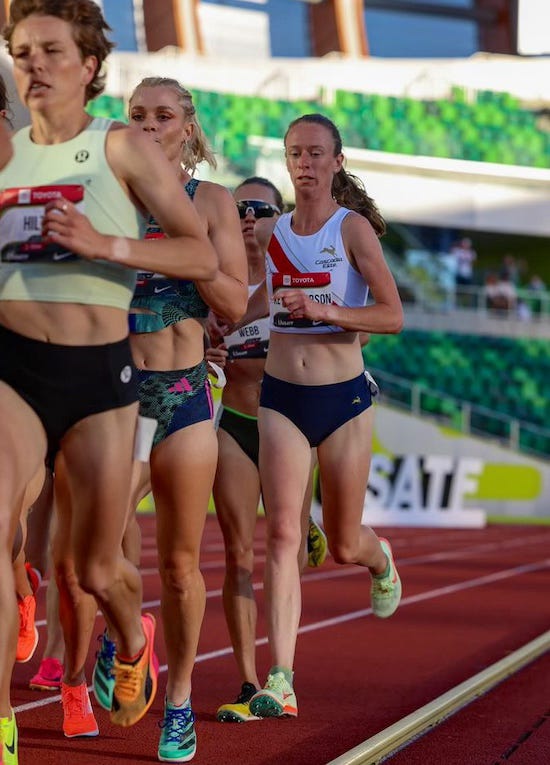
Steady progress led Amelia Keyser-Gibson to her first Trials qualifier
Current Residence: Seattle, Washington
Instagram: @amelia.kg
Team: Cascadia Elite
In her debut marathon, Amelia Keyser-Gibson ran 2:36:13 at the 2022 California International Marathon and qualified for the Olympic Marathon Trials. A 2018 Haverford College graduate, Keyser-Gibson also qualified for the 2023 USATF Outdoor Championships in the 1500, despite never qualifying for Division III outdoor nationals in college.
“Sustainability was at the forefront of how the program worked,” Keyser-Gibson said of her college experience. “I was able to see some success, but I still had some big goals once I graduated and I thought I could improve more based on how my progression in college had been.”
After college, she moved to Boston and found herself in the midst of an active post-collegiate running community. For those first couple of years, she would base her training around a goal each season, such as breaking five minutes in the mile for the first time. Two of Keyser-Gibson’s training partners qualified for the 2020 Marathon Trials, and although she didn’t feel ready for the marathon right out of college, it seemed like something she could go after in the next four years. “I think the biggest turning point was seeing how many women had qualified,” Keyser-Gibson said. “It seemed like a really cool celebration of where women’s running is.”
During the pandemic, she started experimenting with longer training. Keyser-Gibson knew that CIM in 2022 was one of the first big opportunities to qualify for the Trials, so while she went in with the goal of an OTQ, knowing that there would be other chances kept the pressure off. “I just wanted to have a good first experience in the marathon,” she said.
Now, Keyser-Gibson attends graduate school at the University of Washington’s School of Environmental and Forest Sciences, where she studies plant biology. And she runs for Cascadia Elite, a mostly-remote team based out of the Pacific Northwest. “The schedule can be flexible, but it is a lot of work. I don’t have a 9–5 I can clock out of at the end of the day and [stop worrying] about,” she said of balancing the two. “But running is a nice break from thinking about grad school, and work is something I’m excited about, so I don’t just spend a lot of time thinking about running. I think they complement each other well.”
At the Trials, Keyser-Gibson is hoping to compete well, and to demonstrate how she has grown as a runner and in the marathon since her debut.
Sylvia Bedford is focused on running her own race in her return trip to the Trials
Current Residence: South Jordan, Utah
Instagram: @sylviabedford
Sylvia Bedford qualified for her second Olympic Marathon Trials by running 2:36:34 at the 2022 Grandma’s Marathon. She graduated from Southern Utah University, where she fell in love with running, in 2013. It was a team tradition for alumni to run the nearby St. George Marathon the fall after graduating, putting their fitness from the previous year of competing to work. She and her father both decided to race it. “The marathon was miserable, I had no idea what I was signing up for,” she said. “But when you finish, you just feel so accomplished.”
Bedford began running marathons for fun, and her times kept improving. She won the St. George Marathon in 2018 and 2019, setting a course record of 2:34:19 during her second win. (The course has too much downhill to be eligible for Olympic Trials qualifying.) In 2018, she met a friend who was more knowledgeable about the competitive running world, who introduced her to the idea of qualifying for the Trials. They both ran the 2018 Grandma’s Marathon and qualified for the 2020 Trials.
Bedford unfortunately got sick during her peak training weeks for the 2020 Trials, and despite a great buildup, ran far off of her goal on race day, finishing 172nd in 2:47:53. “I probably went out too hard considering the course, and I hadn’t prepared well for the hills,” she said. “Still, it was an amazing experience and I loved every second.”
Bedford worked as a personal trainer at Lifetime Fitness for 10 years and often ran with a run club there. For the past two years, she has met up with Savannah Berry, another two-time Trials qualifier, for workouts. With an 8-year-old and 2-year-old, she runs early in the morning, and she fits in doubles during naptimes or in the evening. After the Trials, she plans to open a treadmill studio, where she will teach interval classes and host a run club. “I’m such a social runner,” Bedford said. “I love the community aspect.”
From her experience at the 2020 Trials, Bedford said that she has learned the importance of running her own race. “My pace starting off might not be somebody else’s,” she said. “The crowds are amazing and so exciting, but I need to harness that energy and feel strong, not burn out in the first 10K.”
Training with a team helped Kaitlyn Peale rekindle her passion for racing
Current Residence: Portland, Oregon
Instagram: @kpeale
Team: Bowerman Track Club Elite
Kaitlyn Peale qualified for this year’s Olympic Marathon Trials by running 2:35:40 at the Berlin Marathon in September 2022, after finishing 22nd at the 2020 Trials in 2:37:12. She has trained with the Bowerman Track Club Elite Program since 2017, while working full-time.
She graduated from the University of Michigan in 2011. “I had a pretty decent career there but ended with some on and off injuries, and when I graduated I didn’t really have any desire to continue running competitively,” she said. “I thought that my college PRs would just be my PRs.” She took a job in consulting that required a lot of time and travel, and ran for fun, jumping in occasional races but not seriously preparing for them.
“I knew I wanted to run marathons but never thought I’d go to the Olympic Trials,” she said. “In 2016, I was living in LA and watched the Trials just as a fan.” When she got connected with the Bowerman Track Club, she found her way back to serious training and racing. “It was through being inspired by the people I was running with and the goals they have that I developed the passion for racing again,” she said.
Peale has been dealing with an Achilles injury for the past nine months, which she has been able to train through for the most part, including her race at Berlin. “I decided in the fall that it needed to be taken care of and that it was better to go into the Trials fairly healthy than forcing my way through it on a bad Achilles,” she said. “I took a step back in October and have been building back in a smart way since then.”
Peale said she has been cross training more than she ever has in her life, and she’s confident that she has a strong base of fitness from the rest of the year. “I’m building fitness in an untraditional way,” she said. “My goal is to race healthy and compete the best I can.”
Lexie Greitzer credits “boring old consistency” for her running success
Current Residence: Colorado Springs, Colorado
Instagram: @lexiegreitzer
Lexie Greitzer ran 2:36:10 at the 2023 Grandma’s Marathon to qualify for the Olympic Marathon Trials. She ran with a club as an undergraduate at Indiana University, and then competed for the University of Colorado Colorado Springs for the 2018–19 year as a graduate student, using her final year of NCAA eligibility. “That really started the fire of loving running,” she said. “The team there was just amazing and made me fall in love with competing.” Now Greitzer works as a sports dietician, and continues to train with her UCCS coach, Corey Kubatzy.
Greitzer ran 2:56 in her first marathon in 2019, then dropped 10 minutes to run 2:46 in her second. She ran 2:37:37 (chip time) at the 2022 California International Marathon and missed the standard by 37 seconds but set a nine-minute personal best. “I knew a bunch of people were going for the Trials time, but I had a 2:46 PR so that wasn’t the plan,” Greitzer said. “I set a huge PR, so I was just grateful for that and tried to look at it that way.” She earned her Trials qualifier at Grandma’s, six months later.
“I think it’s boring old consistency,” Greitzer said of her big jumps in performance. “Grandma’s was my first time running a marathon and not just seeing if I could PR. With post-collegiate running, I’ve been very laid back with how much pressure I put on myself.”
During her buildup for the Trials, Greitzer has been managing a nagging calf injury. She originally hoped to outperform her ranking in the race, but she has adjusted to focusing on getting to the start line healthy. “It’s been the most odd marathon block I’ve ever had, because it’s entailed a lot of biking and swimming and not as much running,” she said. “I never thought I’d be here and I don’t want to lose out on this opportunity. Even if it’s not the race I thought it was going to be, I want to enjoy this experience.”
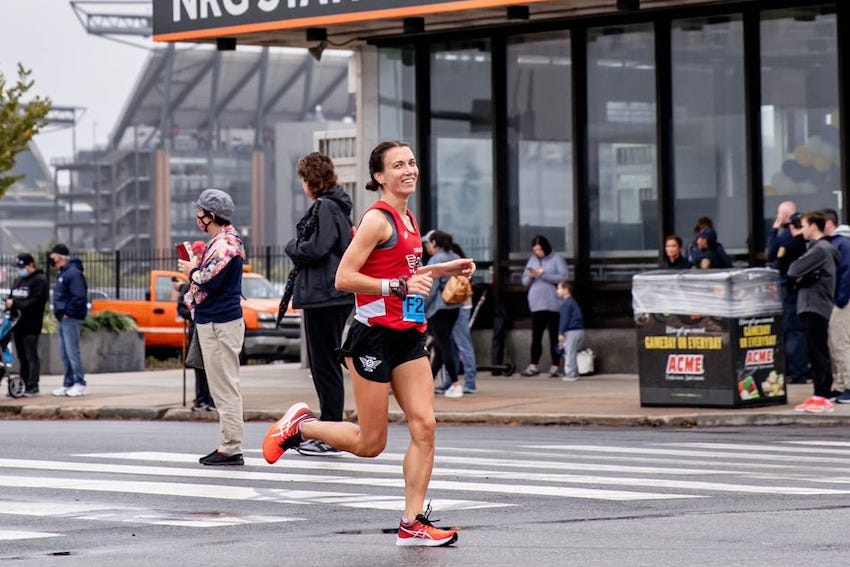
Prioritizing recovery helped Elaine Estes break through
Current Residence: Philadelphia, Pennsylvania
Instagram: @lainey.estes
Team: Philadelphia Runner Track Club
In her third try at the distance, Elaine Estes ran 2:36:08 (2:35:59 chip time) to qualify for the Olympic Marathon Trials at the 2023 California International Marathon. Estes ran for St. Joseph’s University and graduated in 2020. “I came in as a walk-on,” Estes said of her college experience. “I didn’t have a whole lot of pressure on me, I was only trying to outdo myself all the time and try my best, so I was on an upward trajectory.”
Partially because she graduated from college during the pandemic, Estes did not immediately start training seriously. But when races started again, her desire to compete was still there. “I find it hard not to take running seriously,” she said. “I can’t really see myself just jogging.”
Estes joined the Philadelphia Runner Track Club, the city’s largest running club, which she said has not only given her training partners but important friendships post-college. Seeing the women she runs with every week go after their own Trials qualifiers was a large factor in her decision to chase the qualifier herself. “Those women taught me everything I know about the marathon,” she said.
Estes works as a high school Spanish teacher, which means that there isn’t much flexibility in her schedule, as she has to be at work from 7:30–2:30 Monday through Friday. She does all of her training in the afternoon, and often depends on her training partners to get her out the door.
Estes believes that prioritizing recovery, in addition to her hard work, has been a crucial part of the upward trajectory she has continued since college. “It’s about knowing when enough is enough and taking a day off when I’m feeling over the edge,” she said. “I listened to that part of my brain more in the cycle before CIM, and then I PRed by a lot. It’s weird to say, but I think it was not pushing through as much that allowed me to arrive a little bit fresher and more relaxed overall.”
Estes hopes to give the best she can on the day at the Trials. “I’m looking forward to connecting with women who have accomplished the same thing,” she said.
A near miss in college helped inspire Brittney Hall’s post-collegiate success
Current Residence: Ann Arbor, Michigan
Instagram: @brittney__hall
During her last track season at Western Michigan University, Brittney Hall was 10 seconds away from qualifying for NCAA Regionals in the 10,000m. “That lit a fire underneath me,” she said. “After college, I knew I still had more in me.”
Hall graduated in 2022 and now works full-time as a hand therapy fellow at the University of Michigan. She gravitated toward the longer events in college, so it made sense to turn to the marathon. She made her debut at the 2022 Indianapolis Monumental Marathon. She hoped to break 3:00 there and did by a lot, running 2:50:24. She lowered her time to 2:42:56 at the 2023 Toronto Marathon, and from there, set her sights on an Olympic Marathon Trials qualifier.
Hall earned her qualifier in her third marathon, running 2:36:39 at Bakline’s McKirdy Micro Marathon in October 2023. “It was really cool to be part of a group of runners working together to achieve that same OTQ goal,” Hall said. “I really feel like I’m a part of something bigger than myself, being out there with all these other crazy runners.”
Hall hopes to continue her progression at the distance in Orlando and in the coming years. “A year and a half ago I had just started training for a marathon, and now here I am qualifying for the Olympic Trials,” she said. “I’m super excited to have this opportunity to run with all of my idols and be in that environment.”
Holly Clarke embraces the team aspect of the sport
Current Residence: San Francisco, California
Instagram: @hollywoodclarke and @sfrunnergirly
Team: Peninsula Distance Club
At the 2018 California International Marathon, Holly Clarke ran a nearly 30-minute personal best of 2:43:04 (2:42:56 chip time) to qualify for the 2020 Olympic Marathon Trials. Clarke raced CIM again in 2021, where she ran 2:36:52 shortly before the Trials qualifying window opened. “I felt pretty confident that I could do that again,” she said. Clarke ran 2:34:54 at CIM a year later and qualified for her second Trials.
Clarke graduated from Johns Hopkins in 2014, where she was a multiple-time All-American and contributed to two national team titles in cross country. “When I graduated from college, I was really burnt out so I took a year off and ran my first marathon in 3:29, just to run a marathon,” she said. “From there it was just me chipping away to find the joy I wanted to find in running. I equate it to the jump from high school to college running, of learning how to run well in a new stage of life.”
For Clarke, this joy comes from the team aspect of the sport. After moving to the Bay Area, she ran the San Francisco Marathon. When she was struggling at the end, another woman in the race helped her by physically pushing her across the finish line. Afterwards, the woman told her about some of the local post-collegiate clubs, which she had never heard of. Clarke competed for the Impala Racing Team for several years, and she became a member of the Peninsula Distance Club, coached by Dena Evans, in September 2023.
Several highly-competitive women joined PDC around the same time, influenced by each other’s decisions. “All these stars aligned and we have this incredible crew right now where the women just have this edge,” Clarke said. “I feel like I’m in college again.” She has done most of her Trials training with Maya Weigel, who competed in the 10,000m at the 2021 Olympic Track Trials and is also qualified for this year’s Marathon Trials.
In addition to working with a team, Clarke credits her balanced approach for the longevity that has led to her large performance jumps. That includes only allowing herself to run one marathon per year. She is currently pursuing her master’s degree in organizational development, and has started a coaching business on the side. “I train folks of all ranges and abilities,” she said. “My ethos is finding the joy in running and taking a balanced approach.”
Clarke said that while she is ranked in the middle of the pack headed into the Trials, she has her sights on a top-50 finish. “I want to be as competitive as possible, putting myself in a position where I’ll race smart but also place the highest,” she said. “I want to experience this race and have a good taste in my mouth.”




